What is the Schengen Area?

Posted on Wed 19 May 2021
Having been originally established in 1995, the Schengen Area is a term used to refer to countries that have abolished passport control and other forms of border control at their mutual borders. Although this may not mean much for UK citizens, it does have an important role for European and international travellers. In this article, we look at why the Schengen Area was implemented, the countries that abide by the agreement and what it means for travellers heading to those countries.

History of the Schengen Agreement
The area that makes up the Schengen Area ultimately is changeable depending on countries that opt in or opt out of the agreement. Some countries, such as Belgium, France, Germany and Spain have been in the area since its conception, on 26th March 1995. Other countries, such as Norway, Hungary and Denmark joined later, with Liechtenstein being the latest addition joining in 2011.
Although 1995 was the first year of the official agreement, free movement is something that has been happening for thousands of years, with physical borders being a new revelation. The pioneers of the Schengen Agreement were France and Germany which were two of the first countries to raise the topic of free movement at the European Council in 1984. This then led to other countries getting involved ultimately leading to the creation of the Schengen agreement.
The area now comprises of 26 European countries and states which allow travellers free movement throughout those countries.

Purpose of the Schengen Agreement
The main purpose was to abolish internal borders between all member states, meaning in effect the Schengen Area could be considered one large country. It’s important to remember that although all of the countries are in the continent of Europe, they are not all members of the Schengen agreement, nor is this agreement linked with the EU. The area is made up of countries which are both in and out of the EU; at time of writing, the UK is not part of the Schengen Area but is part of the EU (just), which is why we require a passport to travel to these countries. Travellers from France that are heading to Portugal for their holiday do not require a passport as both countries are within the Schengen Area.
This also means that travellers from outside of Europe such as Asia or the Americas can treat the area as one large country as opposed to lots of smaller ones. This makes gaining a visa a lot more straightforward as one visa will allow visitors to travel to multiple countries within the 90-day time limit. A more straightforward visa process also means that visiting these countries becomes a much more appealing option for both long and short term travel, which will bring more money into the economy.

What Does This Mean?
If you’re UK based and are planning to visit a country that is included within the Schengen Area for less than 90 days, there is nothing to worry about, although there is some uncertainty around how Brexit will affect travelling to the EU and Schengen countries. For a UK citizen, you’ll need your passport to be allowed into any of the Schengen countries as we are not part of the agreement and if you plan on staying for longer than 90 days, you will need to look into gaining a visa. It’s important to note that the 90-day limit is based on a 180 day period, which means you can leave and return as many times as you like within 180 days, but you cannot stay for more than 90 cumulative days (without a visa).
Also, it’s worth noting that once you have been allowed into the destination country, you are able to cross the borders within the Schengen countries without the need of a passport. This is equally true for citizens of the countries as they will not require as a passport for Schengen-based travel.
Some countries are conveniently located within the makeup of Europe to allow for long-term travellers to spend time there to allow their allotted 90 time period to recover. Countries such as Albania, Ukraine and Montenegro are all bordered, or close to a Schengen country which means you can still explore Europe without the need of getting a visa!
There are plenty of other reasons to make a trip to a country such as Montenegro; the beautiful, crystal clear water and fascinating heritage are just some of the draws of this amazing country. We offer some fantastic Montenegro tours which you can check out here!
Read more from our blog here
